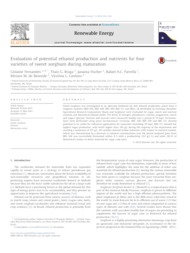Evaluation of potential ethanol production and nutrients for four varieties of sweet sorghum during maturation.
Evaluation of potential ethanol production and nutrients for four varieties of sweet sorghum during maturation.
Author(s): FERNANDES, G.; BRAGA, T. G.; FISCHER, J.; PARRELLA, R. A. C.; RESENDE, M. M. de; CARDOSO, V. L.
Summary: Sweet sorghum was investigated to an alternate feedstock for fuel ethanol production. juices from 4 sorghum varieties (BRS 506, BRS 508, BRS 509, BRS 511 and BRS); all developed by Embrapa (Brazilian Agricultural Research Corporation) Maize and Sorghum) were evaluated for sugar, starch and nutrient contents and theoretical ethanol yields. The levels of nitrogen, phosphorus, calcium, magnesium, starchand sugars (glucose, fructose and sucrose) were measured weekly over a period of 70 days. Fermentations were performed using yeast Saccharomyces cerevisiae. BRS 508, BRS 509 and BRS 511 showed potential to be useful for industrial applications for maturities exceeding 30 days. BRS 511 showed the highest sugar production, with levels higher than 140 g/L during the majority of the experiment and reaching a maximum of 191 g/L. All varieties showed similar behaviors with respect to nutrient content, which was characterized by a decrease in nutrient concentrations over the period analyzed. Juice from BRS 508 was successfully fermented within 8 h with a productivity (9.0 g/L h) and yield (90.5% of theoretical) similar to those observed for sugar cane juice.
Publication year: 2014
Types of publication: Journal article
Unit: Embrapa Maize & Sorghum
Observation
Some of Embrapa's publications are published as ePub files. To read them, use or download one of the following free software options to your computer or mobile device. Android: Google Play Books; IOS: iBooks; Windows and Linux: Calibre.
Access other publications
Access the Agricultural Research Database (BDPA) to consult Embrapa's full library collection and records.
Visit Embrapa Bookstore to purchase books and other publications sold by Embrapa.

